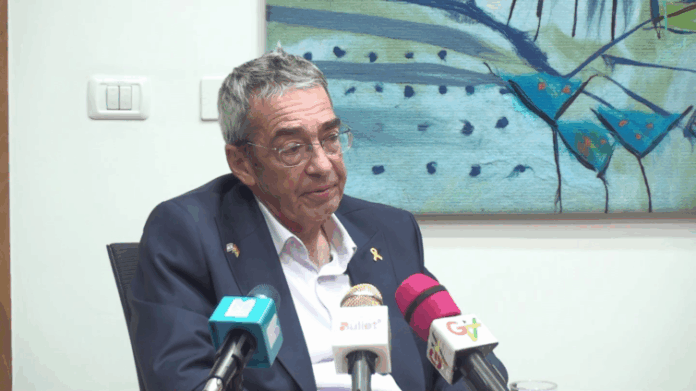The Israeli Ambassador to Ghana, H.E. Roey Gilad, has criticised the action of Ghana’s Minister of Foreign Affairs, Samuel Okudzeto Ablakwa, to adopt a recent United Nations report and accuse Israel of conducting genocide in the Gaza Strip, calling the move “a very wrong thing to do.”
During a press briefing this week, Ambassador Gilad addressed the contentious adoption, which follows the release of the comprehensive report by the UN’s Independent International Commission of Inquiry (COI) on the Occupied Palestinian Territory.
The ambassador challenged the basis of the accusation, arguing that the designation of genocide, particularly when applied to the Jewish state, carries immense historical gravity.
“Genocide is a very, very serious blame, especially when you blame Israel,” Ambassador Gilad stated, noting that the term itself was coined by Polish-Jewish lawyer Raphael Lemkin in 1944, a survivor of the Holocaust, “to depict what happened in the Holocaust.”
The Question of Intent and Hamas’s Role
The core of the Ambassador’s defence rested on the legal definition of genocide, which requires establishing specific intent (“dolus specialis“) to “annihilate completely” a national, ethnical, racial, or religious group.
“The main definition of genocide is the intent. If you have an intention to annihilate completely, to destroy the other side, this is genocide,” he explained.
Ambassador Gilad unequivocally shifted the accusation of genocidal intent onto the non-state actor, Hamas, which controls the Gaza Strip.
“The attitude of Hamas towards Israel is genocidal. They say there is no room for a Jewish sovereign state in the Middle East,” the Ambassador asserted. “Actually, if you can blame somebody for being genocidal, this is the Hamas. Israel was forced to conduct a war in Gaza against a terror organisation.”
Tragedy, Collateral Damage, and Military Comparison
The Israeli envoy acknowledged the immense human cost of the conflict, which the UN report—a document of more than 70 pages that the ambassador said he had read in full—details in depth.
“What we saw in Gaza was a huge tragedy. That has to be said. We are not happy with what happened. It was a huge tragedy for the Palestinians, and it was a huge tragedy for us, the Israelis,” he admitted.
However, he stressed that the magnitude of the loss does not determine responsibility.
The military operation, according to the Ambassador, was necessitated by Hamas’s strategy of operating within civilian populations.
He cited the challenge of targeting an estimated 25,000 Hamas terrorists/activists, many of whom utilise an extensive network of tunnels while taking “shelter behind human shields, behind 2 million Palestinians”.
Ambassador Gilad detailed the operational complexities, including the presence of 251 Israeli citizens taken hostage in Gaza and the inevitability of civilian casualties.
“There is no way you can bring down those terrorists… without causing some what is known as collateral damage,” he said, citing the grim reality that Israeli forces even “killed by mistake some of our own people.”
In an effort to contextualise the scale of civilian casualties, the Ambassador controversially compared the Gaza operation to recent Western military campaigns, asserting that Israel’s performance was comparatively superior.
“Judging from the experience of the Americans in Iraq and the Brits in Afghanistan, those things always happen with a lot of collateral damage. I think basically we did a better job than the Americans in Iraq and the Brits in Afghanistan,” he claimed, reiterating, “There was no intent to destroy the Palestinian people. There was an intent to destroy Hamas.”
The Ambassador concluded by describing the Ghanaian minister’s endorsement of the UN report as a “mistake”, though adding that the matter is “already water under the bridge” in diplomatic terms.
Myjoyonline
ALSO READ:


